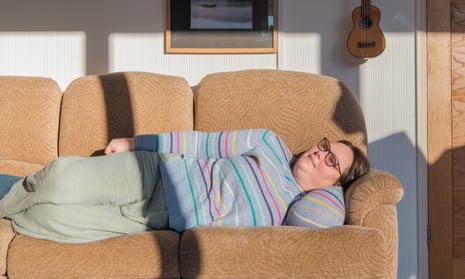Twelve years ago, I’d returned home from my job teaching science at a secondary school in Darlington with a bad headache. By the time my husband, Paul, got back from work and found me flat on the sofa, I was in debilitating pain. He tried to convince me to go to the hospital. I put it off until the morning, but by then I couldn’t move an inch without my head and spine screaming in agony.
During my first week at the hospital, where paracetamol and morphine did nothing to touch the pain, I discovered that lying flat on my back was the only way I found any relief. I was still marking my students’ work. They had their GCSEs coming up and I didn’t want to let them down.
The doctors didn’t know what was wrong with me, so I was transferred to another hospital in Middlesbrough. An MRI and lumbar puncture spotted some subdural effusions – little bubbles at the very top of my brain. This indicated a spinal fluid leak, though they couldn’t figure out where it was.
The diagnosis was spontaneous intracranial hypotension. Also known as a CSF leak, it is more usually seen in women who have had an epidural while giving birth, but in those cases doctors know where the hole in the spine was made and where to direct treatment. It’s usually treated with a blood patch: they take blood from elsewhere in your body and reinject it into the spinal membrane. But with me, they struggled to see where to place it.
The blood patch did give me relief, and I was sent home. Three days later, the pain came back, along with double vision, eye pain, pressure in my head, tinnitus and other hearing problems. Lying down was the only thing that helped. Because of my low spinal fluid pressure, my brain is not supported and sinks into my skull when I stand or sit up, causing these symptoms. Since then, I’ve spent most of my time on the sofa.
I’m in least pain in the mornings, having been lying flat all night. I dress on my bed, with clothes that are easy to pull on. Lots of layers are important, as you get cold more easily when you’re not moving around.
I try to go swimming, with the help of my husband or my carer, Emmie. We also have an allotment; I go there in padded ski clothing so I can lie down with my flowers and plants.
At home, I’ll cuddle up with my house rabbit, Truffle, or teach her new tricks. Reading can be hard, so I prefer podcasts or audiobooks. Some days I have to go back to bed to keep warm.
My life is incredibly different to how it was before. In my 20s, I studied biosciences at Birmingham University. I performed in the university circus society; my speciality was fire poi, a form of fire-spinning which is based on a traditional Māori dance.
After graduation, I volunteered at an orphanage in Morocco, then did my teaching qualification. Paul and I got married, and I went into teaching science. I loved it. In our free time, we went camping, cycling, and bought a stunt kite to take to the beach. Life was adventurous; we were happy.
Since I was first discharged in 2010, various doctors have tried to find a fix; they put a pressure-monitoring system temporarily inside my skull, and then stents into my brain. These helped reduce some of my symptoms, but did not solve the problem.
after newsletter promotion
The pandemic slowed things down, but last year I found a doctor who was willing to give blood patches another try. I had a few weeks where I was able to sit up a bit more, even play my piano; but then the pain came back. Every time an attempt fails, it’s devastating.
Paul has been my rock, a tremendous emotional support. His work in the mental health sector has given him valuable skills and empathy. It’s hard to dream about a future where I’m cured, but I’d love to teach again, and go to Iceland and Uzbekistan. I found a Facebook group of people with CFS leaks; it’s a very positive place where people share their experiences, triumphs and disappointments.
For now, I like to focus on what I can do. I’m fundraising for a recumbent tricycle that will allow me to pedal while lying semi-flat and give me much more independence. This isn’t the life Paul and I dreamed of, and I do feel like a burden sometimes, but I know we have more fun when I let him help me.
As told to Grace Holliday
Do you have an experience to share? Email experience@theguardian.com

Comments (…)
Sign in or create your Guardian account to join the discussion